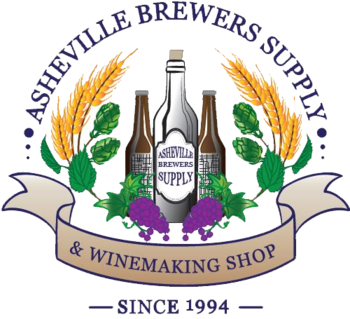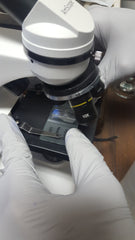New Homebrewing Laws- What's In Them? What Can You Do?
Several years ago, during the sweeping ALE (Alcohol Law Enforcement, a division of the State Bureau of Investigation) crackdown on breweries in North Carolina, the rights, or perceived rights, of NC homebrewers (including wine, cider, and mead makers) were suddenly greatly reduced. At the time, breweries were walking on egg shells to avoid fines and the threat of shutdowns. The laws relating to brewing were antiquated and extremely vague. To further complicate issues, ABC (Alcohol Beverage Commission) and ALE sometimes had differing interpretations of the laws and regulations, and these differences even extended to the officers themselves, with one ALE agent saying an action was illegal while a different one claimed it was fine. The fervor has since died down, but the battle over consistent, clear, and new laws and regulations continues.
During this time, Highland Brewery essentially put the ABC's cross-hairs on homebrewers. For years, Highland has graciously hosted the Blue Ridge Brew Off (BRBO) homebrew competition. This competition is one of the largest in the southeast, and it raises money for the local homebrew club, MALT. Given the dangerous climate at the time, Highland asked the BRBO organizer to check with ABC to ensure that everything was legal. As it turned out, virtually nothing that homebrewers were doing, other than the act itself, was legal. Competitions, transporting homebrew, homebrew meetings where beer was shared, etc.- all illegal or extremely gray area. Needless to say, the BRBO was shutdown, as were all the competitions across the state. This led to a push for new legislation, legislation that would expand and vindicate the rights of homebrewers.
In 2017, the North Carolina General Assembly addressed homebrewing by passing the statute, G.S. 18B-306. The statute in its entirety reads as such-
"§ 18B-306. Making wines and malt beverages for private use.
(a) Authority. – An individual may make, possess, and transport wines and malt beverages for the individual's own use, the use of the individual's family and guests, or the use at organized affairs, exhibitions, or competitions. For purposes of this section, the term "organized affairs, exhibitions, or competitions" includes homemaker's contests, tastings, and judgings.
(b) Selling Prohibited. – Wines and malt beverages made pursuant to this section may not be sold or offered for sale.
(c) Kits. – Wine kits and malt beverage kits may be sold in this State.
(d) Permit. – No ABC permit is required to make wines or malt beverages pursuant to this section"
Though this seems straightforward, the regulatory details are left to the ABC board. For the last year, there has been a back-and-forth happening between the rule makers and a handful of homebrewers. The ABC released their current rule proposals, and there's still a LOT of work that needs to be done. They have extended the comment period to November 5th, so please take some time to write in and voice your concerns (email address info listed at the bottom).

To see the current proposal, which does not take long to read, click here. On Wednesday October 10th, I joined seven other MALT members and we traveled to Raleigh to speak at the public hearing on the proposed rules. Thanks to the hard work of local homebrewer Dave Byer, who spearheaded and coordinated the effort to rally affected homebrewers and clubs, the hearing room was filled with brewers and advocates from all over the state. The turnout was exactly what we'd hoped for, and it was comical seeing the shocked look on the the commission's faces when they entered the hearing room. They remarked multiple times on the incredible participation rate.


While there are a fair number of issues with these regulations, ranging from somewhat nuanced to egregiously impractical and misguided, I used my three minutes speaking time to weigh in on only a few of the problems I see. I am currently finalizing my letter to the ABC board, and the following is the essence of what I see wrong.
It's important to note the far-reaching implications that these rules will have on the future of our state. Aside from the obvious impacts on homebrewers and homebrew shops, the commercial beer industry and the economy is also affected. With the rocketing number of breweries in NC, the economic impact grew from $1.2 billion in 2014, to having topped $2 billion by the end of 2017; that's nearly double in only three years! With just shy of 300 breweries in the state. the brewing industry has added tens of thousands of jobs, tax revenues, a growth in tourism, and a plethora of ancillary jobs in agriculture, sales and distribution, construction, education, etc. None of this directly accounts for the homebrew industry either. It's only relevant to talk about the commercial beer industry, because as we homebrewers all know, homebrewing is the genesis of commercial brewing. According to the American Homebrewers Association, 90% of pro brewers begin as homebrewers. Case in point, I've been losing customers over the last few years as they go on to open breweries (i.e. Bhramari, Hillman, Whistle Hop) or to work for a brewery.
The first issue I see in the proposed rules pertains to guests. Homebrew may be served to a guest, which is defined as an individual personally known to the homemaker or homemaker's family who is invited to the event by direct contact, including in person or by telephone, mail, or electronic mail...." This language prohibits the use of social media, bulletin boards, and in-store flyers. As a homebrew shop owner, this is frustrating as it would make illegal the way we run our Brewers Socials. Not only can I not post about it via social media, but encouraging people to bring friends or people that may be interested in brewing is also illegal. This is not only at odds with the spirit of the event, but it may also adversely impact the store's economy by hindering our ability to connect with potential customers.
Section .2305 is particularly interesting and, I think, one of the most potentially impractical sections of the rules. It pertains to "Home Product Production Education Meetings." This is essentially any educational meeting about homebrewing. It states that such meetings are only open to due paying members of clubs, yet it omits local clubs, which make up most memberships. While the rule does permit charging a fee to attend such meetings and does allow for the tasting of homebrew at these meetings (a HUGE improvement over the past where this would have been viewed as selling homebrew), it may also be limiting ANY educational sort of meeting to due-paying members. This would mean, for example, that I could not teach a lesson on homebrewing to an interested party or teach one of our brew classes unless everyone in attendance were a due-paying member of a club. Also, I'm not sure why its necessary to make the requirement that a member must pay dues at all.
Under section .2302, there are multiple issues that make homebrew competitions diffficult, if not impossible.
(c)1 prohibits holding a competition in a production area of a brewery. This is where most competitions are held since there is the most space and it isn't intrusive toward public areas. The ABC is concerned that somehow homebrew is going to contaminate the commercial beer. As we all know, the beer sits in closed vessels....
(b)4 allows homebrew for competitions to be stored at a permitted ABC retails space for only 48 hours. This is crazy, as 30 days is the current norm. It's unreasonable to think that all the beer being shipped in and delivered to a competition can arrive no more than two days prior. ABC is worried that somehow the homebrew will be mistaken for commercial beer and sold. This is, of course, ludicrous and impossible.
Section .2306 limits the transport of homebrew to the homebrewer. This means no one can transport homebrew except the person that made it. You can no longer give your friend or family or anyone a bottle of beer, wine, cider, mead, etc if it would require them to drive it. Of course, this eliminates drop off sites for competitions and forces would-be competitors to ship their entries (this is illegal).
As I said, there's a lot in the proposal and I could carry on, but the link is above. If you can spare a few minutes to write in, you'll be helping shape the future of this hobby in our state. Send letters to Walker Reagan, the ABC Rule Making Coordinator by Nov. 5th. His email is Walker.Reagan@abc.nc.gov It also cannot hurt to send your input to your state reps, as they passed the original statute and it's important to see how the ABC is subsequently abusing the intent of the law. To find out the politicians that represent you, click here.
Thanks!
- Theodore Clevenger


Comments 1
Brad Shupe
Well writen and true. I’ll be writing to all pertinent state representatives, thanks.
Homebrewer and certified beer judge.